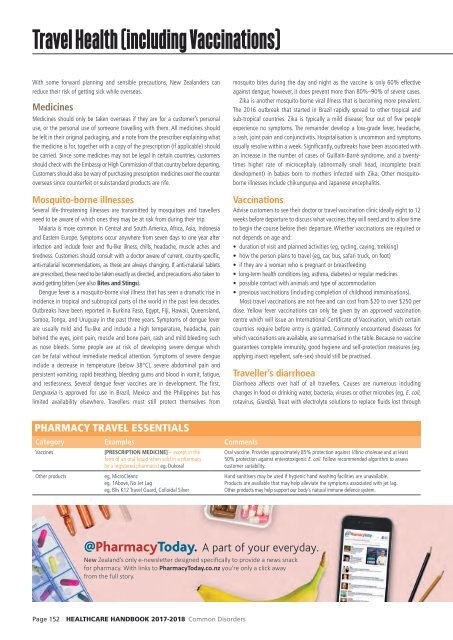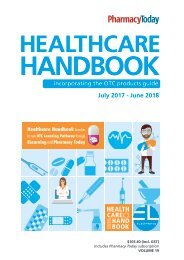2017 HCHB_digital
Create successful ePaper yourself
Turn your PDF publications into a flip-book with our unique Google optimized e-Paper software.
Travel Health (including Vaccinations)<br />
With some forward planning and sensible precautions, New Zealanders can<br />
reduce their risk of getting sick while overseas.<br />
Medicines<br />
Medicines should only be taken overseas if they are for a customer’s personal<br />
use, or the personal use of someone travelling with them. All medicines should<br />
be left in their original packaging, and a note from the prescriber explaining what<br />
the medicine is for, together with a copy of the prescription (if applicable) should<br />
be carried. Since some medicines may not be legal in certain countries, customers<br />
should check with the Embassy or High Commission of that country before departing.<br />
Customers should also be wary of purchasing prescription medicines over the counter<br />
overseas since counterfeit or substandard products are rife.<br />
Mosquito-borne illnesses<br />
Several life-threatening illnesses are transmitted by mosquitoes and travellers<br />
need to be aware of which ones they may be at risk from during their trip.<br />
Malaria is more common in Central and South America, Africa, Asia, Indonesia<br />
and Eastern Europe. Symptoms occur anywhere from seven days to one year after<br />
infection and include fever and flu-like illness, chills, headache, muscle aches and<br />
tiredness. Customers should consult with a doctor aware of current, country-specific,<br />
anti-malarial recommendations, as these are always changing. If anti-malarial tablets<br />
are prescribed, these need to be taken exactly as directed, and precautions also taken to<br />
avoid getting bitten (see also Bites and Stings).<br />
Dengue fever is a mosquito-borne viral illness that has seen a dramatic rise in<br />
incidence in tropical and subtropical parts of the world in the past few decades.<br />
Outbreaks have been reported in Burkina Faso, Egypt, Fiji, Hawaii, Queensland,<br />
Samoa, Tonga, and Uruguay in the past three years. Symptoms of dengue fever<br />
are usually mild and flu-like and include a high temperature, headache, pain<br />
behind the eyes, joint pain, muscle and bone pain, rash and mild bleeding such<br />
as nose bleeds. Some people are at risk of developing severe dengue which<br />
can be fatal without immediate medical attention. Symptoms of severe dengue<br />
include a decrease in temperature (below 38°C), severe abdominal pain and<br />
persistent vomiting, rapid breathing, bleeding gums and blood in vomit, fatigue,<br />
and restlessness. Several dengue fever vaccines are in development. The first,<br />
Dengvaxia is approved for use in Brazil, Mexico and the Philippines but has<br />
limited availability elsewhere. Travellers must still protect themselves from<br />
mosquito bites during the day and night as the vaccine is only 60% effective<br />
against dengue; however, it does prevent more than 80%–90% of severe cases.<br />
Zika is another mosquito-borne viral illness that is becoming more prevalent.<br />
The 2016 outbreak that started in Brazil rapidly spread to other tropical and<br />
sub-tropical countries. Zika is typically a mild disease; four out of five people<br />
experience no symptoms. The remainder develop a low-grade fever, headache,<br />
a rash, joint pain and conjunctivitis. Hospitalisation is uncommon and symptoms<br />
usually resolve within a week. Significantly, outbreaks have been associated with<br />
an increase in the number of cases of Guillain-Barré syndrome, and a twentytimes<br />
higher rate of microcephaly (abnormally small head, incomplete brain<br />
development) in babies born to mothers infected with Zika. Other mosquitoborne<br />
illnesses include chikungunya and Japanese encephalitis.<br />
Vaccinations<br />
Advise customers to see their doctor or travel vaccination clinic ideally eight to 12<br />
weeks before departure to discuss what vaccines they will need and to allow time<br />
to begin the course before their departure. Whether vaccinations are required or<br />
not depends on age and:<br />
• duration of visit and planned activities (eg, cycling, caving, trekking)<br />
• how the person plans to travel (eg, car, bus, safari truck, on foot)<br />
• if they are a woman who is pregnant or breastfeeding<br />
• long-term health conditions (eg, asthma, diabetes) or regular medicines<br />
• possible contact with animals and type of accommodation<br />
• previous vaccinations (including completion of childhood immunisations).<br />
Most travel vaccinations are not free and can cost from $20 to over $250 per<br />
dose. Yellow fever vaccinations can only be given by an approved vaccination<br />
centre which will issue an International Certificate of Vaccination, which certain<br />
countries require before entry is granted. Commonly encountered diseases for<br />
which vaccinations are available, are summarised in the table. Because no vaccine<br />
guarantees complete immunity, good hygiene and self-protection measures (eg,<br />
applying insect repellent, safe-sex) should still be practised.<br />
Traveller’s diarrhoea<br />
Diarrhoea affects over half of all travellers. Causes are numerous including<br />
changes in food or drinking water, bacteria, viruses or other microbes (eg, E. coli,<br />
rotavirus, Giardia). Treat with electrolyte solutions to replace fluids lost through<br />
PHARMACY TRAVEL ESSENTIALS<br />
Category Examples Comments<br />
Vaccines<br />
Other products<br />
[PRESCRIPTION MEDICINE] – except in the<br />
form of an oral liquid when sold in a pharmacy<br />
by a registered pharmacist eg, Dukoral<br />
eg, MicroCleanz<br />
eg, 1Above, No Jet Lag<br />
eg, Blis K12 Travel Guard, Colloidal Silver<br />
Oral vaccine. Provides approximately 85% protection against Vibrio cholerae and at least<br />
50% protection against enterotoxigenic E. coli. Follow recommended algorithm to assess<br />
customer suitability.<br />
Hand sanitisers may be used if hygienic hand washing facilities are unavailable.<br />
Products are available that may help alleviate the symptoms associated with jet lag.<br />
Other products may help support our body's natural immune defence system.<br />
@PharmacyToday. A part of your everyday.<br />
New Zealand’s only e-newsletter designed specifically to provide a news snack<br />
for pharmacy. With links to PharmacyToday.co.nz you’re only a click away<br />
from the full story.<br />
Page 152 HEALTHCARE HANDBOOK <strong>2017</strong>-2018 Common Disorders



